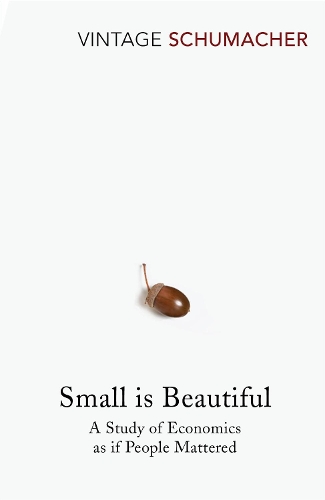
Small Is Beautiful: A Study of Economics as if People Mattered
(Paperback)
Publishing Details
Small Is Beautiful: A Study of Economics as if People Mattered
By (Author) E F Schumacher
Vintage Publishing
Vintage
7th December 1993
16th September 1993
United Kingdom
Classifications
General
Non Fiction
Economic systems and structures
Macroeconomics
Consumerism
Economic theory and philosophy
Ethics and moral philosophy
Social and political philosophy
330
Physical Properties
Paperback
288
Width 128mm, Height 198mm, Spine 18mm
203g
Description
First published in 1973, this controversial study looks at the economic structure of the western world in a revolutionary way. Schumacher maintains that man's current pursuit of profit and progress, which promotes giant organizations and increased specialization, has in fact resulted in gross economic inefficiency, environmental pollution and inhumane working conditions. He challenges the doctrine of economic, technological and scientific specialization, and proposes a system of intermediate technology, based on smaller working units, communal ownership and regional workplaces, utilizing local labour and resources.
Reviews
A book of heart and hope and downright common sense about the future. -- Peter Lewis * Daily Mail *
Author Bio
Before the publication of Small is Beautiful, his bestselling reappraisal of Western economic attitudes, Dr E. F. Schumacher was already well known as an economist, journalist and progressive entrepreneur. He was Economic Adviser to the National Coal Board from 1950 to 1970, and was also the originator of the concept of Intermediate Technology for developing countries and Founder and Chairman of the Intermediate Technology Development Group Ltd (now Practical Action). He also served as President of the Soil Association (Britains largest organic farming organisation, founded thirty years ago) and as Director of the Scott-Bader Company (pathfinders in polymer chemistry and common ownership). Born in Germany, he first came to England in 1930 as a Rhodes Scholar to study economics at New College, Oxford. Later, at the age of twenty-two, he taught economics at Columbia University, New York. As he found theorising without practical experience unsatisfying, he then went into business, farming and journalism. He resumed the academic life for a period at Oxford during the war, afterwards serving as Economic Adviser to the British Control Commission in Germany from 1946 to 1950. In later years, his advice on problems of rural development was sought by many overseas governments. Dr Schumacher was awarded the CBE in 1974. He died in 1977.
